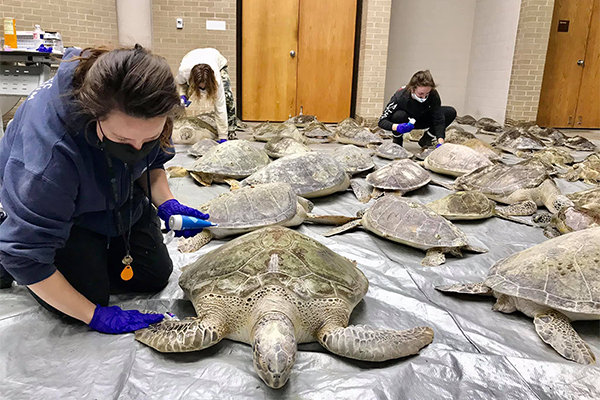Staff and student volunteers at the UT Marine Science Institute’s Amos Rehabilitation Keep worked around the clock to take in over 1,200 green sea turtles during Winter Storm Uri.
Water temperatures along the Texas coast dropped below 50 degrees Fahrenheit during the storm, which left over 10,000 turtles stranded and cold-stunned, said Jace Tunnell, director of the Mission-Aransas National Estuarine Research Reserve. Tunnell said cold-stunned turtles are “basically paralyzed” when their metabolism slows down, leaving them vulnerable to predators and drowning.
“I worked 80 hours last week,” Tunnell said. “I can't tell you how many tons of sea turtles I picked up.”
Tunnell said this storm was the largest cold-stunning event in United States history. Though the facility lost both power and water, he said the biggest issues facing the Amos Rehabilitation Keep were finding enough floor space and keeping up with the amount of turtles coming in.
The keep, one of three turtle rehabilitation centers in the coastal bend area, normally receives between 300 and 500 turtles per year, Tunnell said. He said during the storm, between 200 and 400 rescued turtles were dropped off by the truckload to the keep each day. Approximately 400 of the turtles brought in died, Tunnell said.
Each turtle was weighed, measured, examined and logged in the facility’s database, Tunnell said. He said the turtles were then given eye drops and covered in Vaseline to keep their shells and skin from drying out while they were out of the water.
“When I first showed up, one of the employees was like, ‘There's some Vaseline, there's some eye drops, get to it,’” said Daniel Fraser, a volunteer and marine science graduate student.
Once temperatures increased, community volunteers worked with staff over two days to load 850 of the turtles into vehicles, including a U-Haul truck and an 18-wheeler, to be taken to boats for the release, Tunnell said.
“We kind of just created an assembly line, handing the turtles down and putting them on the boat,” said Taylor Garcia, the director of operations and marketing for Fisherman’s Wharf, who donated boat services for the release.
Equipped with slides made from irrigation pipes, the boats drove 20 miles offshore where the water was warm enough to release the turtles, Garcia said. When the first turtle went down the slide, crew members cheered as it swam away, Tunnell said.
“It was the coolest thing ever,” Tunnell said. “That's when you think, ‘Man, this is pretty cool to be a part of.’”





















